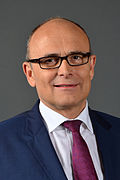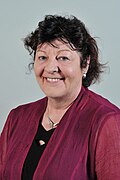Cabinet Sellering II
| Cabinet Sellering II | |
|---|---|
| 8. State government of Mecklenburg-Western Pomerania | |

|
|
| Prime Minister | Erwin Sellering |
| choice | 2011 |
| Legislative period | 6th |
| education | October 25, 2011 |
| The End | November 1, 2016 |
| Duration | 5 years and 7 days |
| predecessor | Cabinet Sellering I |
| successor | Cabinet Sellering III |
| composition | |
| Party (s) | SPD and CDU |
| representation | |
| Parliament | 45/71 |
| Opposition leader | Helmut Holter ( The Left ) |
The Sellering II cabinet acted as the state government of Mecklenburg-Western Pomerania from October 25, 2011 to November 1, 2016 . The SPD under Prime Minister Erwin Sellering continued the grand coalition with the CDU . The coalition agreement was signed on October 24, 2011, and Sellering was re-elected in the Schwerin state parliament the following day . The cabinet was replaced by a renewed red-black coalition under Sellering, the Cabinet Sellering III .
initial situation
An SPD-led grand coalition had ruled Mecklenburg-Western Pomerania since 2006 . In the middle of the legislative period, Erwin Sellering took over the office of Prime Minister from Harald Ringstorff .
The SPD won the 2011 state election with 35.6 percent, clearly ahead of the CDU with 23 percent and the left with 18.6 percent. The Greens moved into the state parliament for the first time with 8.7 percent, the NPD again made it over the five percent hurdle with 6.0 percent and the FDP left parliament with 2.8 percent. The continuation of the grand coalition or the new edition of a red-red coalition thus came into question as realistic coalition options. Such had already ruled in Mecklenburg-Western Pomerania from 1998 to 2006. Before the election, the SPD had not made any statements about the coalition . Both the election manifesto and the list of candidates of the left were seen as a good basis for a red-red coalition.
Coalition agreement
Two and a half weeks after the state elections and after exploratory talks with the CDU and the Left, Prime Minister Erwin Sellering announced that he would enter into coalition talks with the Christian Democrats. The coalition agreement was concluded after three weeks of negotiations. State party conferences of the SPD and the CDU approved it with a large majority.
The coalition agreement provided, among other things, a minimum wage of 8.50 euros for state contracts, which was one of the most important issues in the election campaign and was always rejected by the CDU.
The state government
In the election in the Schwerin state parliament on October 25, 2011, Erwin Sellering received only 42 yes-votes, although the government alliance has 45 seats. A CDU member was missing from the vote. The NPD's opponent, Udo Pastörs , received six votes, one more than the NPD has.
The SPD provided five ministers, the CDU only three instead of the previous four. Jürgen Seidel (CDU), previously Minister for Economics, Labor and Tourism, left the government. Harry Glawe (CDU) took over his ministry, which was now responsible for economy, construction and tourism . Mathias Brodkorb (SPD) became the new Minister for Education, Science and Culture . He took over the office from Henry Tesch (CDU). Two “ super ministries ” were newly created by expanding competencies: Volker Schlotmann (SPD) was now responsible for energy, infrastructure and regional development instead of transport, construction and regional development, and Manuela Schwesig , previously Minister for Social Affairs and Health, was responsible for work, equality and social affairs. In return , Margret Seemann (SPD) lost her position as Parliamentary State Secretary for Women and Equality with cabinet rank and became a simple member of the state parliament again.
Public criticism, especially from the state women's council , provoked the decision to forego a parliamentary state secretary for women and equality in future and to attach the equality department to Minister Manuela Schwesig's Ministry of Social Affairs. The nomination of the 34-year-old Mathias Brodkorb also caused some skepticism. The Education and Science Union (GEW) complained about a lack of willingness to reform in the area of education, which fell far short of expectations of a reform of school policy.
The state government of Mecklenburg-Western Pomerania had the following members:
Web links
- Website of the state government of Mecklenburg-Western Pomerania. Retrieved October 20, 2015 .
- Coalition Agreement 2011-2016. (PDF; 378 kB) Retrieved October 20, 2015 .
Individual evidence
- ↑ handelsblatt.com: "Wonderful - but poor as a bag of sand" (September 1, 2011)
- ↑ tagesspiegel.de: Cuddle election campaign on the coast (May 13, 2011)
- ↑ ndr.de: SPD wants to continue to govern with CDU ( Memento from September 23, 2011 in the Internet Archive ) (September 21, 2011)
- ↑ a b press release. 246/2011. State Chancellery, October 24, 2011, accessed October 20, 2015 .
- ↑ ndr.de: Agreement on minimum wage for state contracts ( Memento from December 22, 2011 in the Internet Archive ) (October 12, 2011)
- ↑ ndr.de: Sellering remains head of government in the northeast ( memento of October 27, 2011 in the Internet Archive ) (October 25, 2011)
- ↑ a b ndr.de: Divided response to coalition agreement ( Memento from October 22, 2011 in the Internet Archive ) (October 20, 2011)
- ↑ press release. 200/2013. Prime Minister, October 22, 2013, accessed October 20, 2015 .
- ↑ press release. 56/2014. Prime Minister, April 1, 2014, accessed October 20, 2015 .










